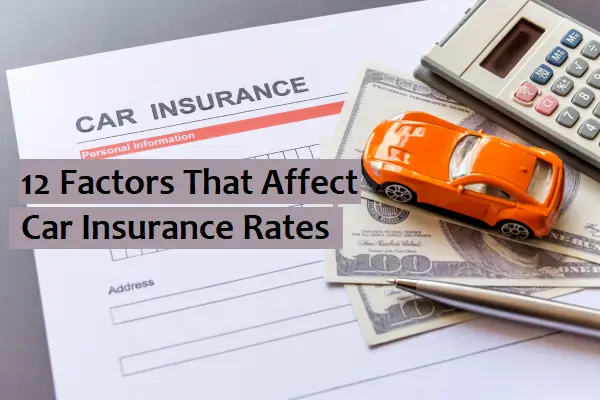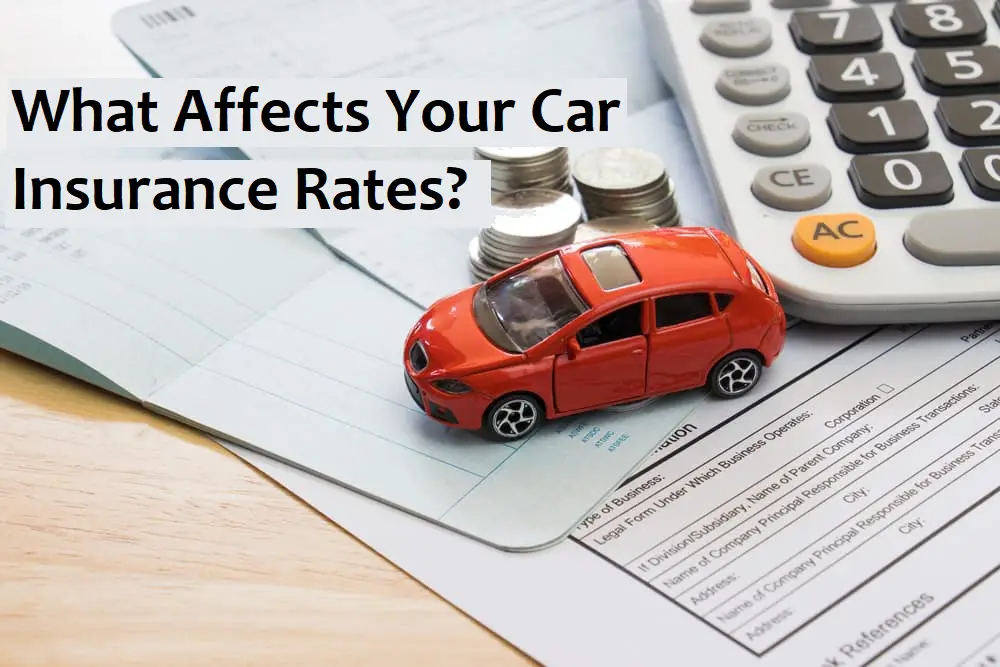What Affects Your Car Insurance Rates is a question many drivers ask as they see their premiums change over time. Understanding the variables behind car insurance costs is crucial for budgeting and for making smart choices when shopping for coverage. Insurance companies use a wide range of factors to determine your car insurance rates, some of which you can control, and others that are based on broader risk calculations.

1. Your Driving Record
One of the most influential factors in determining what affects your car insurance rates is your driving history. Insurance companies assess your risk level based on past behavior.
- Accidents: Even if you were not at fault, accidents can increase your premiums.
- Traffic Violations: Speeding tickets, DUIs, and reckless driving citations are red flags.
- Claim History: Multiple claims in a short time period can label you as high-risk.
Tip: Drive cautiously and consider defensive driving courses to help lower your rate over time.
2. Age and Experience
Younger drivers generally pay more because they are statistically more likely to be involved in accidents.
- Teen Drivers: High-risk due to inexperience.
- Senior Drivers: Rates may rise again in older age due to slowed reaction times.
Tip: Young drivers can lower costs by staying on a parent’s policy or maintaining good grades.
3. Location
Where you live and park your car plays a significant role in what affects your car insurance rates.
- Urban vs. Rural: Urban areas tend to have more traffic, theft, and vandalism.
- ZIP Code Risk Profile: Insurers analyze crime rates, accident frequency, and even weather patterns in your area.
Tip: If moving, compare rates by ZIP code to understand potential cost changes.
4. Vehicle Type and Usage
The make, model, and usage of your vehicle are also major components of your insurance premium.
- Luxury or Sports Cars: Higher repair/replacement costs mean higher premiums.
- Safety Ratings: Vehicles with high safety ratings often cost less to insure.
- Annual Mileage: The more you drive, the higher your chances of an accident.
Tip: Drive a car with good safety and reliability ratings and keep annual mileage low.
5. Credit Score
While controversial, your credit history can be used to calculate your car insurance premium in many states.
- Higher Scores = Lower Risk: Insurers associate good credit with financial responsibility.
- Poor Credit = Higher Rates: Poor credit can lead to higher perceived risk.
Tip: Monitor and improve your credit score to see long-term reductions in insurance costs.
6. Coverage Selections
The types and limits of coverage you choose significantly impact your rates.
- Liability Only vs. Full Coverage: Full coverage includes comprehensive and collision, which cost more.
- Deductible Amounts: Lower deductibles increase premiums and vice versa.
- Add-ons: Roadside assistance, rental car coverage, and gap insurance will raise your costs.
Tip: Choose coverage that meets your needs but doesn’t go overboard.
7. Insurance History
Having continuous coverage shows insurers you’re a responsible policyholder.
- Lapses in Coverage: Can label you as high-risk.
- Length with Current Insurer: Loyalty can sometimes earn discounts.
Tip: Don’t let your policy lapse, even if you’re between vehicles.
8. Gender and Marital Status
Statistical data shows some correlations between gender, marital status, and driving habits.
- Men vs. Women: Young men often pay more.
- Married People: Statistically less likely to file claims.
Tip: While you can’t change these for insurance reasons alone, know how they factor in.
9. Claims Frequency in Your Area
If your area experiences frequent claims—whether due to accidents, crime, or natural disasters—this can drive up premiums for everyone.
Tip: Choose parking options that reduce risk, like garages or secure lots.
10. Discount Eligibility
Many insurance companies offer various discounts that can offset high premiums.
- Multi-Policy Discount: Bundle home and auto insurance.
- Safe Driver Discount: For no accidents or tickets.
- Good Student Discount: For high school or college students.
- Low Mileage Discount: For drivers who don’t travel far.
Tip: Always ask your insurer about available discounts and eligibility.
11. Telematics and Usage-Based Programs
Modern insurers offer apps or devices that track your driving behavior.
- Safe Driving Habits: Can lead to real-time discounts.
- Driving Data: Includes speed, braking, mileage, and time of day.
Tip: Enroll in these programs if you’re a careful driver and want to reduce your premium.
12. State Laws and Regulations
Insurance is regulated at the state level, and each state sets its own rules regarding minimum coverage requirements and what insurers can consider.
Tip: Research your state’s insurance laws before comparing quotes.
13. Annual Re-Evaluation by Insurers
Most insurers reassess your risk profile annually.
- Policy Renewal Time: Rates can go up or down depending on your recent behavior.
Tip: Regularly compare quotes to ensure you’re getting the best deal.
Final Thoughts
Understanding What Affects Your Car Insurance Rates empowers you to make informed decisions that can lead to significant savings. From your driving record to your ZIP code, insurers weigh numerous variables when calculating premiums. While some factors like age and gender are beyond your control, others—such as your credit score, coverage levels, and vehicle choice—can be actively managed to reduce costs.
By staying informed and proactive, you can not only secure affordable coverage but also avoid unexpected rate hikes. Make it a habit to review your policy regularly and shop around to ensure you’re getting the best value for your money.
If this article was informative also checkout: How Credit Scores Affect Insurance Rates
also checkout: Click Here



